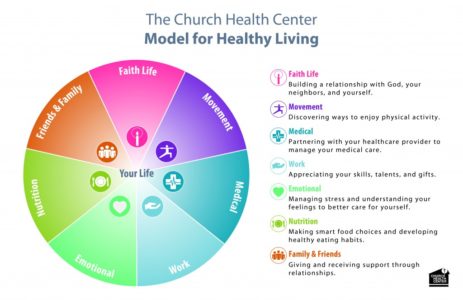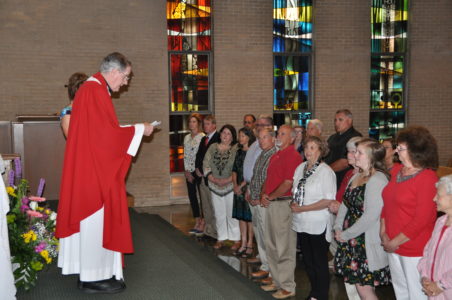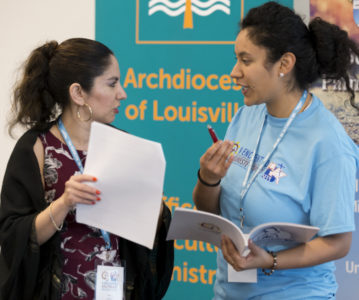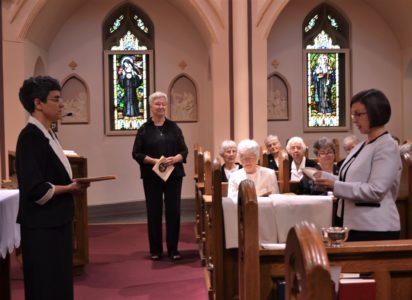By Carol Glatz
VATICAN CITY (CNS) – God wants his disciples to bring his mercy and love to everyone, everywhere on earth, which means it may cost them their “good name,” comfort and their life, Pope Francis said on the feast of Sts. Peter and Paul.
Following Christ requires “that we open our hearts to the Father and to all those with whom he has wished to identify,” particularly the downtrodden, the lost and the wounded, “in the sure knowledge that he will never abandon his people,” he said during a Mass in St. Peter’s Square June 29.
“Jesus wants to liberate his disciples, his church, from empty forms of triumphalism: forms empty of love, empty of service, empty of compassion, empty of people,” he said. The Mass was celebrated the day after Pope Francis created 14 new cardinals from 11 different nations.
Both new and old cardinals as well as 30 archbishops appointed over the course of the past year were invited to be in Rome to concelebrate the feast day Mass with Pope Francis. The archbishops came from 18 countries, the majority coming from Latin America and others from Africa, Asia and Europe.
As has become standard practice, Pope Francis did not confer the pallium on new archbishops during the liturgy, but rather, blessed the palliums after they had been brought up from the crypt above the tomb of St. Peter. As each archbishop approached him by the altar, the pope handed each one a small wooden box tied with a thin gold ribbon. The actual imposition of the woolen band was to take place in the archbishop’s archdiocese in the presence of his faithful and bishops from neighboring dioceses.
The pallium is a woolen band that symbolizes an archbishop’s unity with the pope and his authority and responsibility to care for the flock the pope entrusted to him.
Addressing the cardinals and archbishops during his homily, the pope spoke about what Peter teaches them about the life and risks of being Christ’s disciple.
It was Peter who recognized Jesus as “the Christ, the son of the living God,” and it was Peter whom Jesus turned to, saying “You are Peter and upon this rock I will build my church.”
But, when Jesus showed his disciples he must go to Jerusalem, be killed and be risen, it was Peter who protested.
Jesus “kept bringing the father’s love and mercy to the very end. This merciful love demands that we, too, go forth to every corner of life, to reach out to everyone, even though this may cost us our ‘good name,’ our comforts, our status … even martyrdom.”
Peter reacts to this mandate of martyrdom by saying, “God forbid, Lord! No such thing shall ever happen to you,” which makes him become “a stumbling stone in the Messiah’s path,” the pope said.
“Thinking that he is defending God’s rights, Peter, without realizing it, becomes the Lord’s enemy; Jesus calls him ‘Satan.’” he said.
“Like Peter, we as a church will always be tempted to hear those ‘whisperings’ of the evil one, which will become a stumbling stone for the mission,” the pope said.
Sharing in Christ’s mission, which is to anoint the people, the sick, the wounded, the lost and the repentant sinner, so that they may feel “a beloved part of God’s family,” means sharing Christ’s cross, which is his glory.
“When we turn our back on the cross, even though we may attain the heights of glory, we will be fooling ourselves, since it will not be God’s glory, but the snare of the enemy,” he said.
Do not be Christians who keep “a prudent distance from the Lord’s wounds,” because Jesus touches human misery and “he asks us to join him in touching the suffering flesh of others,” the pope told those assembled.
Updates
A Reminder from your friends in the Catholic Charities Parish Health Ministry
More than 90 percent of skin cancers are caused by sun exposure. Limit your time in the sun.
However excess exposure to the SON of God through prayer is a good practice!
For more information on Parish Health Ministry for your congregation, contact Sister Pat Clemenat 601-213-6378 or email: sisterpat.clemen@ccjackson.org.

ChristLife team commissioned
VICKSBURG – The first group from St. Paul Parish to complete the first part of the ChristLife series was commissioned by pastor Father Tom Lalor on May 20. ChristLife is an evangelization program for Catholics. Several parishes in the Diocese of Jackson are using it including Flowood St. Paul, Jackson St. Richard and Madison St. Francis of Assisi. (Photo by Mary Margaret Halford)

Human trafficking workshop planned
By Maureen Smith
JACKSON – The Associates of the School Sisters of Notre Dame are joining with Mississippians against Human Trafficking and the Catholic Charities Faith in Action (FIAT) Team to offer a one-day symposium on human trafficking on Saturday, August 18, from 10 a.m. to 4 p.m. at St Mary of the Pines retreat center in Chatawa.
A joint study conducted in Mississippi indicates that human trafficking is an active industry in the state. Building awareness of the signs of trafficking and establishing relationships between advocates and law enforcement can help combat the problem.
Debbie Shinskie, one of the speakers at this event, is the respect life coordinator for the Archdiocese of New Orleans. In her diocese, teams of people praying outside abortion clinics became concerned about groups of girls coming in with the same older man. It turns out, their pro-life work to oppose abortion became an outreach to those who had been trafficked as well. In June of 2017 Shinske wrote a column about her efforts which was published by the U.S. Conference of Catholic Bishops.
“Dioceses around the country are developing various ways to respond to this urgent situation. The Archdiocese of New Orleans’ local response is part of a comprehensive approach modeled on the U.S. bishops’ Pastoral Plan for Pro-Life Activities, the Catholic blueprint for respect life activities at the national and local levels.

Image courtesy of BigStock
“In addition to raising public awareness about sex trafficking, the multi-faceted approach includes a train-the-trainer element. Recent statistics indicate that 87 percent of trafficking survivors had contact with a healthcare provider during the time they were being trafficked, with 57 percent of these situations involving a women’s clinic, urgent care facility, or some other type of neighborhood clinic.
Catholic healthcare providers, those who pray and counsel outside abortion facilities, and others who might encounter trafficking victims are getting the training they need to recognize and assist victims,” she wrote. Shinsky will speak at this workshop on the use of social media in trafficking.
Ashlee Lucas, who works in the Mississippi branch of the Department of Homeland Security will speak about how law enforcement works with local communities to combat this problem. Sue Allen, coordinator for Parish Social Ministry for Catholic Charities will offer insight into labor trafficking.
The day will end with some reflection on next steps. The cost is $10 and includes lunch. Register by calling Chris at 301-266-0433 or Anne at 225-223-8408.
Encuentro process aims to identify, train 20,000 Hispanics to be leaders
By Norma Montenegro Flynn
WASHINGTON (CNS) – The National Fifth Encuentro of Hispanic Latino Ministry has inspired Alicia Carrillo to “smell like sheep,” echoing Pope Francis urging pastoral workers to get out and be among the people.
She is one of the 20,000 new Hispanic Catholic ministry leaders that the encuentro process aims to identify and train.

Eva Gonzalez, Hispanic ministry director from the Archdiocese of Louisville, Ky., speaks Feb. 23 with Susana Becerrie of Jackson, Miss., at the Southeast Regional Encuentro. Held for the church’s episcopal regions V and XIV, the gathering took place Feb. 22-24 at Our Lady of Guadalupe Church’s parish complex. On hand were 340 leaders from among some 30 dioceses in the Southeastern U.S. (CNS photo/Tom Tracy)
Carrillo, a Mexican middle-aged woman and a single mother, answered the call to be a missionary disciple when her parish priest picked her to lead a group visiting parishioners no longer attending Mass in their neighborhood in Ligonier, Indiana. The town has a high Hispanic immigrant population, predominantly Mexican.
“This experience has taught me to go on, to continue reaching out to people and as Pope Francis said, to smell like sheep, to be among those rejected by others,” Carrillo said in Spanish. “Like the image of the merciful Jesus carrying a lamb on his shoulders, we must see the needs of others, their suffering, their weariness.”
An introvert who deflects any attention, Carrillo never imagined she would address a crowd of nearly 200 ministry leaders from Indiana, Illinois and Wisconsin at their Region VII encuentro held in June at the University of Notre Dame. She was a delegate representing the Diocese of Fort Wayne-South Bend, Indiana.
Identifying and forming new leaders like Alicia, particularly among youth and young adults, has been a priority from the start according to members of ENAVE, the V Encuentro’s National Team of Accompaniment, represented by 42 national and regional Catholic organizations that serve Hispanics.
“These are the leaders we hope to find through the encuentro; who may not necessarily feel they are prepared, but they have received the call and they have recognized this is a call for them from God, and they would have to acquire the skills and the abilities they need to serve better,” said Chicago Auxiliary Bishop Alberto Rojas, chairman of the Region VII encuentro.
Engaging and preparing leaders to be the voices of their parish communities who can bring up their needs to church and government authorities is essential, Bishop Rojas added in an interview with Catholic News Service.
Although Hispanics represent about 40 percent of U.S. Catholics overall and 54 percent of millennial Catholics, those numbers are not reflected in leadership roles.
“We are very aware that Hispanics/Latinos are underrepresented in every category and level of pastoral leaders in the church, with the possible exception of parish volunteers,” said Ken Johnson-Mondragon, national coordinator of research for the National Fifth Encuentro, or V Encuentro, and an ENAVE member.
“Given the demographic shifts taking place in the Catholic Church in the U.S., this represents a significant problem, and the V Encuentro seeks to both engage new leaders directly and inspire young Catholics to visualize a life in ministry, whether consecrated or lay,” he added.
The total number of new leaders participating in the encuentro process is not yet available, however, about 47,000 people have participated in diocesan encuentros, as reported by 144 dioceses across the country.
An initial survey conducted last summer, also shows that that up to 26,000 people from about 2,400 parishes were trained in 142 participating dioceses. However, the survey does not specify the number of new leaders, according to the V Encuentro’s research team.
Through mission, consultation and community building, what has been a multiyear encuentro process seeks to establish ways in which the Catholic Church can respond to the Hispanic presence in parishes around the country. The recommendations that emerge at the national level will provide a basis for a pastoral plan for Hispanic ministry in the U.S.
About 3,000 new and seasoned leaders, like Carrillo, will be selected to participate in the national gathering, slated for September, in Grapevine, Texas.
Seeing how much people appreciated a word of encouragement amid their suffering, motivated Carrillo to continue serving and inviting others to return to the church. “I told myself, it’s time to stop watching TV at home while there are others who are alone and suffering so much.”
She also encourages others to pray for those who suffer even if they do not welcome their outreach, and to pray rather than criticize.
Fathers, brothers of Sacred Heart celebrate Feast Day
By Maureen Smith
SOUTHAVEN – The brothers and sisters of the Sacred Heart celebrated their feast day on Friday, June 9 with a Mass and reception at Christ the King Parish. The order provides priests who act as pastors and administrators to six parishes in north Mississippi. They also sponsor Sacred Heart Southern Missions, which runs two schools, Southaven Sacred Heart and Holly Springs Holy Family as well as offering social service programs throughout the area.
Bishops end border visit, call reunification of children urgent
By Rhina Guidos
SAN JUAN, Texas (CNS) – In less than 48 hours, a group of Catholic bishops saw the faces of triumph and relief from migrants who had been recently released by immigration authorities, but ended their two-day journey to the border with a more “somber” experience, visiting detained migrant children living temporarily within the walls of a converted Walmart.
During a news conference after the second and last day of their visit July 2, they stressed the “urgent” need to do something to help the children.
The separation for some of the children began shortly after U.S. Attorney General Jeff Sessions announced in early May that if migrants wanted to take their chances crossing the border illegally with their children, they faced the consequence of having them taken away – and he implemented a policy doing so.
Widespread outrage in the weeks following led to President Donald Trump essentially rescinding the policy in mid-June. But the stroke of the pen could not automatically reunite the children and parents who had been and remain apart.
“The children who are separated from their parents need to be reunited. That’s already begun and it’s certainly not finished and there may be complications, but it must be done and it’s urgent,” said Cardinal Daniel N. DiNardo of Galveston-Houston, president of the U.S. Conference of Catholic Bishops.
The visit to the facility known as Casa Padre capped the bishops’ brief journey to the border communities of McAllen-Brownsville near the southern border.
Trump picks Judge Brett Kavanaugh as Supreme Court nominee
By Carol Zimmermann
WASHINGTON (CNS) – President Donald Trump announced July 9 that his nominee for the Supreme Court is Judge Brett Kavanaugh, a federal appeals court judge in Washington and a Catholic who once clerked for retiring Justice Anthony Kennedy.
“What matters is not a judge’s personal views but whether they can set aside those views to do what the law and the Constitution require,” Trump said in his announcement at the White House, adding: “I am pleased to say I have found, without doubt, such a person.”
He said the nominee has “impeccable credentials” and is “considered a judge’s judge.”
“I am grateful to you and I am humbled by your confidence in me,” said Kavanaugh, who was standing near his wife and two daughters.

Brett Kavanaugh, a Catholic, who is a judge on the U.S. Court of Appeals for the District of Columbia Circuit, smiles July 9 at the White House in Washington after President Donald Trump named him his Supreme Court nominee. (CNS photo/Jim Bourg, Reuters)
Kavanaugh spoke about his Catholic faith saying he tries to live by the motto instilled in him by his Jesuit high school: “be men for others.” Kavanaugh, like Justice Neil Gorsuch, attended Georgetown Prep, a Jesuit boys school in Maryland. He also pointed out that his former pastor, Msgr. John Enzler, was in the audience. He said he he used to be an altar boy for him and now the two serve the homeless together. The priest is the president and CEO of Catholic Charities of Washington. Kavanaugh also gave a shout-out to the girls basketball team at his parish which he coaches. He said the team has nicknamed him “Coach K,” the name given to Duke basketball’s head coach Mike Krzyzewski.
Kavanaugh said if he is chosen to be on the Supreme Court he would “keep an open mind in every case” and “always strive to preserve the Constitution of the United States and the American rule of law.”
Immediately after Justice Anthony Kennedy’s announced his retirement June 27, Trump said he would move quickly to nominate a replacement, saying he would review a list of candidates from the list he had to fill the seat now held by Gorsuch after the death of Justice Antonin Scalia.
Kennedy is one of five Catholic justices on the Supreme Court along with Chief Justice John Roberts and Justices Clarence Thomas, Samuel Alito and Sonia Sotomayor.
Kavanaugh, 53, is a Yale Law School graduate who currently serves on the U.S. Court of Appeals for the District of Columbia Circuit, where he has authored more than 280 opinions. He was part of the Independent Counsel Kenneth Starr’s Whitewater investigation, which ultimately led to President Bill Clinton’s impeachment by the House and acquittal by the Senate.
His biography on the court website notes that he is a regular lector at his church, the Shrine of the Most Blessed Sacrament in Washington. He also volunteers for the St. Maria’s Meals program at Catholic Charities, has coached CYO, tutors at the Washington Jesuit Academy and belongs to the John Carroll Society, a group of Catholic lawyers and professionals.
He dissented from a recent ruling by the D.C. Circuit Court of Appeals that a teenager in an immigrant detention center was entitled to seek an abortion. He claimed the decision would give immigrant minors a right to “immediate abortion on demand,” but urged the government to transfer her to private custody so she could do “as she wished.”
Kavanaugh also dissented from a majority decision of the D.C. Circuit that rejected a request from the Archdiocese of Washington and Priests for Life to have the full court review their challenge to the Affordable Care Act’s contraceptive mandate.
He said that “the regulations substantially burden the religious organizations’ exercise of religion because the regulations require the organizations to take an action contrary to their sincere religious beliefs.” But he also wrote that the government “has a compelling interest in facilitating access to contraception for the employees of these religious organizations” and should “achieve it in other ways.”
Two of the other judges reported to be top picks as nominees are also Catholic: Judges Amy Coney Barrett and Thomas Hardiman. Judge Amul Thapar, on a broader top list, is also Catholic.
The nominee must be confirmed by the Senate in order to have a seat on the Supreme Court. The Senate Judiciary Committee will hold hearings questioning the nominee and if the committee approves, a vote for or against the nominee goes to the full Senate floor and must be approved with a simple majority or 51 votes. – –
(Follow Zimmermann on Twitter: @carolmaczim.)
Mississippi Knights of Columbus dedicate summer weekends to Carmelites
By Brett Kenyon
JACKSON – On Saturday, June 9, several dozen men of varying ages, backgrounds, skill levels, and from multiple Mississippi parishes gathered in South Jackson. Armed with chain saws, hammers and paint brushes the local representatives of the Knights of Columbus began tackling a mammoth project — restoring the South Jackson Carmelite Monastery to help the cloistered nuns in their mission.
The inspiration for the project began at Easter, when Father Lincoln Dall of Pearl St. Jude led a retreat for the sisters. “While I was out here, they told me there was a lot of help that they needed,” Father Lincoln explained. “They showed me a gazebo and a prayer hermitage that had been damaged maybe 10-12 years ago, and had just been abandoned. They told me how much they would like to have those up and running again.”
That was the moment the Knights of Columbus entered the picture. As an organization originally founded to help widows and children, the project was a perfect fit for the Mississippi Knights, and the men quickly began putting together a plan under the organization of Knight Victor (Vic) Gray-Lewis of Jackson Saint Richard’s council.
“We’re just a group of Catholic men who love our Catholic faith,” Gray-Lewis said. “We’re just worker bees. We’re worker bees and that’s what we’re here doing today.”
The first weekend of work tackled two primary goals — restoring the grounds by removing years of overgrowth from the monastery walls and paths, and restoring the sisters’ gazebo to a safer, sturdier state. The purpose of the work goes well beyond aesthetics, however, as well-maintained grounds are a vital part of the sisters’ mission.
“The Carmelites are a cloistered order of nuns,” explains Father Lincoln, “their primary charism is to pray; to pray for the area and be a presence of God in a special way to the city of Jackson. They run a gift shop to earn a living and to cover expenses, but their primary purpose is to be contemplative and to pray.”
The thick trees and brush covering the monastery walls and encroaching on the sisters’ walking path has been all but removed. The shingles and broken screens have been removed from the gazebo and fresh paint and tar paper have been applied. There’s still plenty of work left to do. The Knights have returned twice now since the initial June 9 project, and they plan to keep coming back.
“The hope is, we’d like to take this project and make it a monthly effort,” Gray-Lewis explained. “If each council could take a month to work on maintenance, something minor just to help out the sisters here. We could do a monthly rotation or maybe even a bi-monthly rotation.”
To volunteer, email Father Lincoln Dall at lincoln95@hotmail.com or Victor Gray-Lewis at victorg@vicksburg.org.
(Brett Kenyon is a member of Jacskon St Richard Parish and serves as the Creative Services Director for 16 WAPT in Jackson.).
Clinton woman becomes Benedictine Sister St. Marie
By Sister Elisabeth Meadows, OSB
“To seek God together” These words were the immediate response of Sister Michelle St. Marie when asked what drew her to the community of Benedictine Sisters at Sacred Heart Monastery in Cullman, Alabama. She saw within the balanced life of prayer and work in monastic community a way in which her desire for God could be expressed and nurtured. Her exploration of this life and initial formation in it over the past seven years culminated on July 7, with her perpetual monastic profession. With this profession, Sister Michelle made a permanent commitment to monastic life within the community of Benedictine Sisters at Sacred Heart Monastery in Cullman.
Father John O’Donnell, O.S.B. presided at Mass. Sister Tonette Sperando, O.S.B., Prioress of the community, led the rite and received Sister Michelle’s vows. Joining the community for the celebration were Sister Michelle Renee’s sisters Paulette Haynes and Annie Scarborough along with their families, Oblates of the monastery, and friends.

CULLMAN, Ala. – Sister Michelle Renee reads the promises of her monastic profession as Sister Tonette Sperando (left), Prioress; Sister Mary McGehee, Scholastic Director; the monastic community; and the assembly listen. (Photo courtesy Sister Elsabeth Meadows)
Sister’s journey to Sacred Heart began in Warren, Ohio, where she was born to Jeremy and Joan St. Marie. Baptized at St. Pius X Catholic Church, Sister Michelle attended local Catholic and public schools. During her teenage years, Sister Michelle’s family relocated to Clinton, Mississippi, where she completed high school.
A desire to help others led Sister Michelle to study occupational therapy at the University of Mississippi Medical Center in Jackson. After graduating, she began a career as a pediatric occupational therapist, working for nearly 20 years with seriously ill and injured children at Blair Batson Children’s Hospital at the University of Mississippi Medical Center. During her years in Mississippi, Sister Michelle was an active parishioner at Holy Savior Parish.
Sister Michelle’s connection with the Benedictine Sisters traces back to her high school years when she attended a vocation retreat at the monastery. Her continuing remembrance of this retreat and a deepening sense of God’s call led her back to Sacred Heart, at first for retreats and eventually for vocation discernment. In November 2011, Sister Michelle entered Sacred Heart Monastery as a postulant. The following year she was formally received into the community as a novice, receiving the religious name of Sister Michelle Renee St. Marie.
Sister Michelle Renee’s first two years in the monastery as a postulant and novice were spent immersed in community life, the common work of the monastery, and study of scripture, liturgy, monastic history and Benedictine spirituality. After completing her novitiate, Sister began ministry in the Cullman area as an Occupational Therapist, making home and school visits to children in need of rehabilitation or therapy services. After two years, Sister transitioned to ministry in Birmingham, working at United Ability in the Hand-in-Hand Early Learning Program and living in community with other Benedictine Sisters in Birmingham. Currently, Sister Michelle Renee remains in this ministry, working with children from two to five years of age and also mentoring occupational therapy students.
(Sr. Elisabeth Meadows, OSB, is the director of the Benedictine Retreat Center in Cullman, Ala.)
